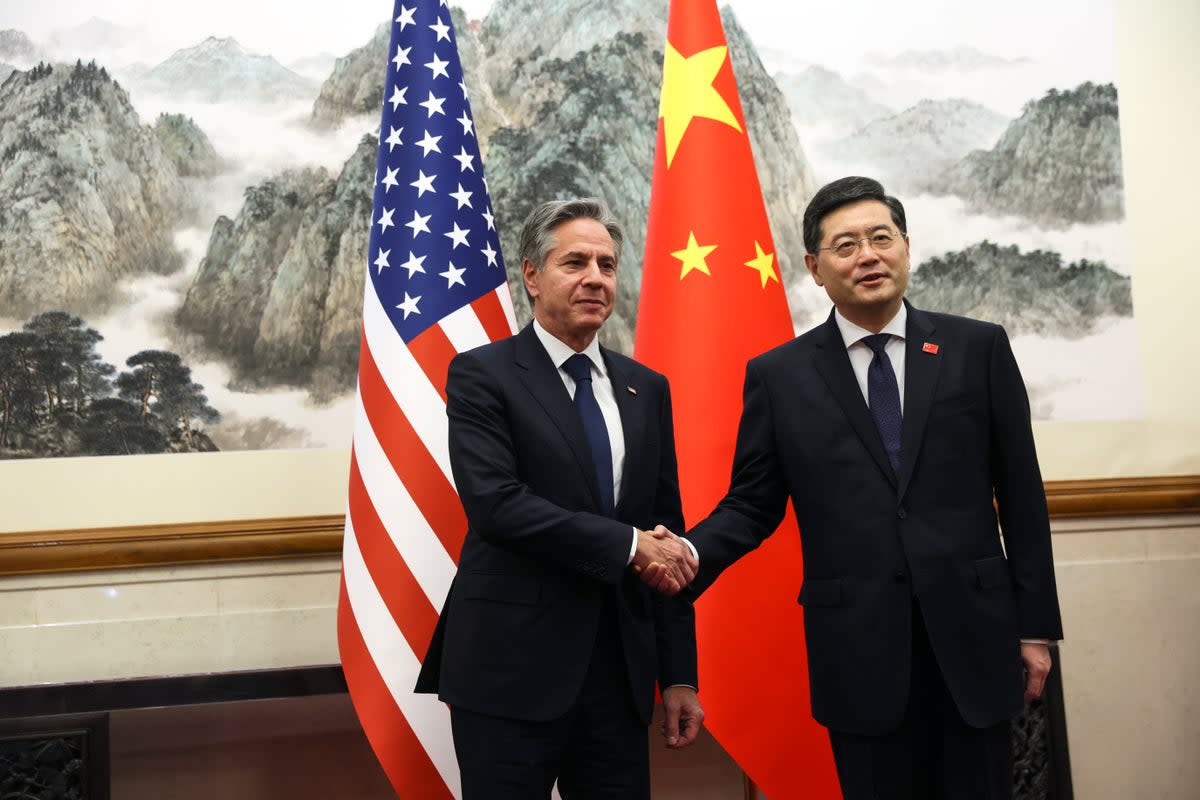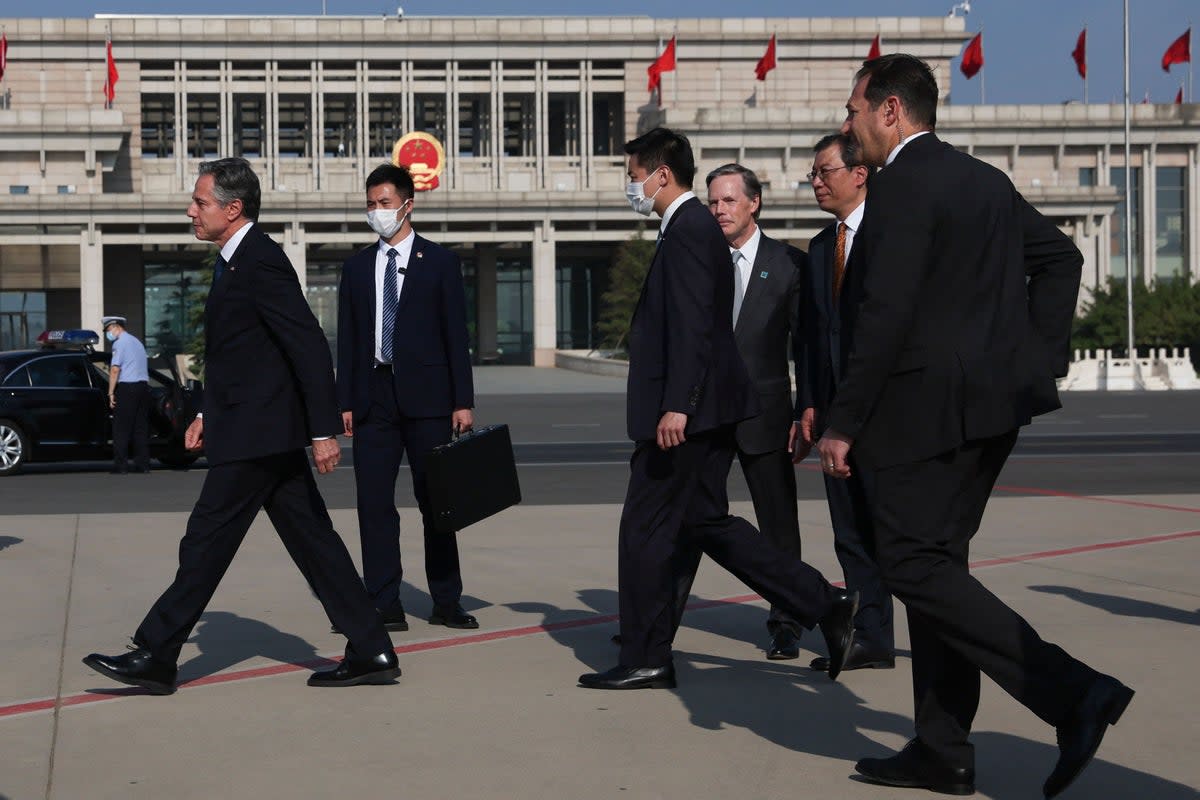Blinken seeks to warm up frosty US-China relations in high-stakes Beijing trip

US secretary of state Antony Blinken has met China’s foreign minister Qin Gang in Beijing, the first in a series of high-stakes talks seeking to improve the frosty relations between the world’s two largest economies.
Mr Blinken is the first secretary of state to visit China in five years and the most senior US official to travel to Beijing since Joe Biden became president.
Starting Sunday morning, Mr Blinken’s two-day visit has a number of contentious issues on the agenda, including trade with Taiwan, Russia’s war in Ukraine and surveillance allegations by both sides.
Mr Blinken’s trip was initially planned for February, but was postponed after the US accused China of flying surveillance balloons over military facilities on the US mainland.
Mr Blinken and his group met Mr Qin in the grounds of Beijing’s Diaoyutai State Guest House on Sunday. The first photo opportunity of the trip reflected the state of US-China relations, with a business-like handshake during an initial exchange of pleasantries.
After heading into a meeting room, neither Mr Blinken nor Mr Qin made comments in front of reporters who were briefly allowed in. Their meeting lasted for more than five hours, a US state department spokesperson said, before they had moved to a working dinner.
“Hope this meeting can help steer China-US relations back to what the two presidents agreed upon in Bali,” Hua Chunying, China’s assistant foreign minister who is attended the meeting, tweeted alongside a picture of the duo.
Mr Blinken is also expected to meet China’s top diplomat Wang Yi on Monday and possibly President Xi Jinping.
Mr Biden and Mr Xi agreed to schedule Mr Blinken‘s trip at a meeting last year on the sidelines of the G20 in Bali.
Hope this meeting can help steer China-U.S. relations back to what the two Presidents agreed upon in Bali. pic.twitter.com/C9zPwjSDen
— Hua Chunying 华春莹 (@SpokespersonCHN) June 18, 2023
The discussions are expected to cover a wide range of contentious issues that have strained bilateral ties and have significant implications for global security and stability. As well as Taiwan and Ukraine, other topics on the agenda for the US side include human rights concerns in China, the situation in Hong Kong and Chinese military assertiveness in the South China Sea.
US officials said on Friday before Mr Blinken’s departure that he would raise each one of these concerns, while playing down the chances of a major breakthrough.
@SecBlinken meets Foreign Minister Qin Gang. No visible smiles. They exchanged a few pleasantries about Blinken's flight over and then sat down across from each other. Press were herded out before they said anything. pic.twitter.com/tNP3fWEhEo
— Iain Marlow (@iainmarlow) June 18, 2023
Nonetheless, China has made positive sounds about the prospect of generally reducing tensions in recent days. In a meeting with Microsoft co-founder Bill Gates on Friday, Mr Xi said the US and China can cooperate to “benefit our two countries”.
“I believe that the foundation of Sino-US relations lies in the people,” Mr Xi told Mr Gates. “Under the current world situation, we can carry out various activities that benefit our two countries, the people of our countries, and the entire human race.”
China also hosted Elon Musk recently in what was seen as a sign of willingness to improve business relations with the US.

Mr Biden told White House reporters on Saturday he was “hoping that over the next several months, I’ll be meeting with Xi again and talking about legitimate differences we have, but also how ... to get along”.
The two leaders are likely to attend the next G20 summit in September in Delhi, and Mr Xi has been also invited to attend the Asia-Pacific Economic Cooperation (APEC) grouping in San Francisco this year.
Ahead of the visit, Mr Blinken emphasised the importance of the US and China establishing and maintaining better lines of communication.
The US wants to make sure “that the competition we have with China doesn’t veer into conflict” due to avoidable misunderstandings, he told reporters.
#Breaking: US Secretary of State Antony Blinken has arrived in Beijing, embarking on a two-day visit to China where he will meet with senior Chinese officials to discuss the US-China relations. pic.twitter.com/k4HoO8MrmD
— Global Times (@globaltimesnews) June 18, 2023
Mr Biden and Mr Xi had made commitments to improve communications “precisely so that we can make sure we are communicating as clearly as possible to avoid possible misunderstandings and miscommunications”, Mr Blinken said on Friday.
“There’s a recognition on both sides that we do need to have senior-level channels of communication,” a senior state department official told reporters during a refuelling stop in Tokyo en route to Beijing.
“That we are at an important point in the relationship where I think reducing the risk of miscalculation, or as our Chinese friends often say, stopping the downward spiral in the relationship, is something that’s important,” the official said.
Additional reporting by agencies
